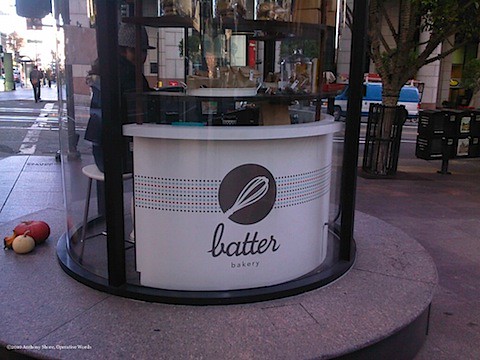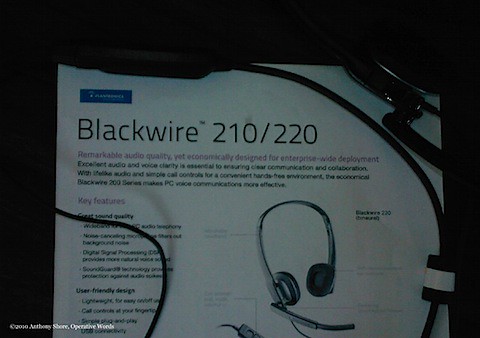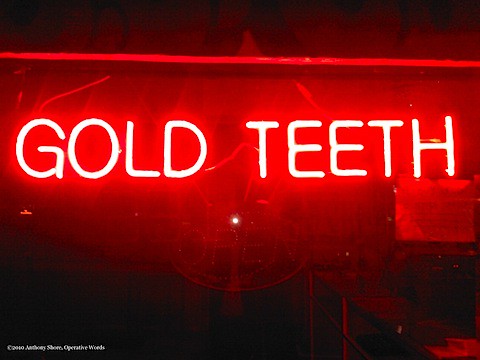Venerable brands like General Electric, Kentucky Fried Chicken, National Biscuit Company and International Business Machines didn't hide their business name behind metaphors or fuzzy ideas. Each name was a hammer. It delivered one message with brute, blunt force. And it was good...for a while.
Eventually those companies established a path followed by countless others. They cut short their names to cut free of their restrictions, trading names too burdened with meaning for ones that were utterly meaningless: GE, KFC, Nabisco, IBM.
The trend in naming since has been away from the harsh, direct light of descriptive names and towards the shaded canopy of evocative and arbitrary ones. The change is partly motivated by necessity, as descriptive names are difficult or impossible to protect as trademarks.
But it's not just the law: It's a good idea. Descriptive names are similar to other descriptive names so they aren't differentiated and thus don't get noticed (not without a ton of money).
Today, the vast majority of brand names are not descriptive at all.
And I think people are getting tired of it.
The pendulum is swinging back, towards names -- and marketing in general -- that's honest and bullshit-free. Maybe even humble.
Living in San Francisco, I've sought examples of words in commerce that speak the unvarnished truth. I've documented some of these sightings with my cell phone camera. Several relate to food because I am a gastropod.

This Little Cookie: Absolutely adorable. This is disarming partly because its design is slightly flawed, as if the cookie maker ran out of space scribbling This Little Cookie but was too busy baking to perfect the label. The name, reminiscent of This Little Piggy, and the letters' uneven spacing give the whole package an authentically human and unmanufactured quality.

This tidy kiosk is a perfect setting for a brand called Batter. It's a name that's immediate, short, and to the point with nothing artificial added. It suggests their baked goods are as pure and simple.

Food Should Taste Good: Not just a simple message, but a four-word name. Because it doesn't follow the established convention of big companies and their short, sharp brand names, Food Should Taste Good feels a little home-made. It's a little unpolished and that's OK. Preferable, actually.

You know about MECE? Pronounced "mee-see", McKinsey Consulting says that the best solutions are Mutually Exclusive and Collectively Exhaustive. They include everything they need and nothing they don't.
Tasty Salted Pig Parts? 100% MECE.

Ichthyo: Breathtaking! So honest and so arresting! A word like that...Ichthyo...that twisted car wreck of a consonant cluster! Why, words like that shouldn't be allowed!
And words like that are not allowed in the sweeping majority of the world's languages. But it just so happens that ichthyo was A-OK in ancient Greek, the mother tongue of much scientific and technical nomenclature, including terms like ichthyo and architecture. (Notice how the book's title and subtitle dovetail perfectly?)
A title as inscrutable and unpronounceable as Ichthyo is an irritant -- an itch -- that lures in the reader to scratch. And yet despite the word's alien, other-worldly quality, it just means "fish".

Blackwire is the same as Ichthyo but different. They are both honest yet unexpected. Ichthyo is entirely unfamiliar, whereas Blackwire seems oddly familiar. In a world becoming ever more untethered -- insecure -- a product that actually celebrates its cord stands out. What's good for power cords, spinal cords and umbilical cords is good for headsets, too.
My firm, Operative Words, named and worked on the nomenclature for the Blackwire family of PC headsets by Plantronics.

It's clear they mean well enough. The Diversity Center [of Santa Cruz] is obviously committed to inclusivity, as enumerated in their tagline above the entrance. I don't know if Lesbian, Gay, Bisexual, Transgender, Intersex and Questioning Community -- lesbiana, gay, bisexual, transgénero, intersex, inquisitivo en Español -- would qualify as mutually exclusive and collectively exhaustive.
But collectively, it's exhausting.
I wish there was a better and more succinct way for The Diversity Center to describe all of these alternative sexualities. If you've got ideas, throw them in the comments section. If nothing else, your submissions will place Operative Words among some pretty interesting Google search results.

How could anyone resist INTERESTING ITEMS!?
Names like that: Not fair.

What qualifies a particular truth for inclusion in a product's name? Every product has many true qualities and a name can express but one or two.
Consider this sign for Passive Lawn in New York City's Washington Square Park. It used to be that a lawn was a lawn was a lawn. Activities officially disallowed were listed on a conspicuous notice: No Ball Playing. No Radios. No Smoking. And so on. Until recently, there was no characterization of the lawn itself.
Urban planners and municipal parks departments evidently need to distinguish different types of public lawns, so those intended for quiet pursuits are branded "passive". (A lawn where activities are allowed would presumably be called an active lawn but a cursory online search uncovered no evidence of its use.)
As I wrote in Describe Different, an innovative product deserves an innovative generic descriptor. The most effective new product descriptors combine familiar terms in unfamiliar ways. The best ones are intuitive and accurate. They are truthful.
Passive Lawn strives for truth but it's not the whole truth nor is it intuitive. The novel use of passive requires a mental leap because it defines a new class of passive -- inactive? -- activities. Inadequate as a stand-alone name, Passive Lawn needs the support of No Sports and No Dogs to convey what's not allowed.
I've considered alternatives to Passive Lawn but they are more flawed. Inactive Lawn might suggest it's entirely off-limits, especially with a chained perimeter like the one above. Quiet Lawn is interesting but also misses the mark.
Perhaps the best solution would be the traditional one: A simple list of prohibited activities. Defining the lawn itself -- something useful for urban planners and parks department workers -- isn't very helpful for park visitors. If this sign simply read No Sports, No Dogs, we'd know all we need to know.
In this case, no name would have been preferable to one whose truth is not self-evident.

Up to now, I've focused on truth in meaning. Names and other commercial words can be functional and obvious and honest, yet also unique.
Although meanings are important, so are appearances. The presentation of a name -- font, size, color, materials, etc. -- can magnify, minimize or morph its meaning.
Which brings us to our last exhibit, GOLD TEETH, a spectacular example of meaning and manifestation in true alignment; a visual and verbal syzygy. These words don't merely deliver, they shove. In a compounding reaction, gold and teeth -- each picturable words individually -- combine and project a third mental image that beams so vividly we are compelled imagine it: A gleaming yet incongruous smile flaunting gilded teeth.
This picture in our minds, already palpable and dazzling, is intensified by the words' physical representation: Electric neon, red and shining like polished gold. It is expressive, smiling broadly, exuding the same confidence we might associate with someone who would choose gold for their pearly whites.
It's as if every detail were punctuated with exclamation points: GOLD! TEETH! RED! NEON! CAPITALS!
The honesty of this sign, its stark message and medium, makes it impossible to ignore.
Today's consumers are overwhelmed by marketing excess and underwhelmed by unfulfilled promises. They have become inured to marketing that's rife with the artifice of ambiguity and embellishment. Consumers are disillusioned because much of what they've seen are illusions. Only unabashed honesty will change that.
Like never before, truth is stronger than fiction.
[A version of this post was originally published at Duets Blog, the leading blog on creativity and the law.]